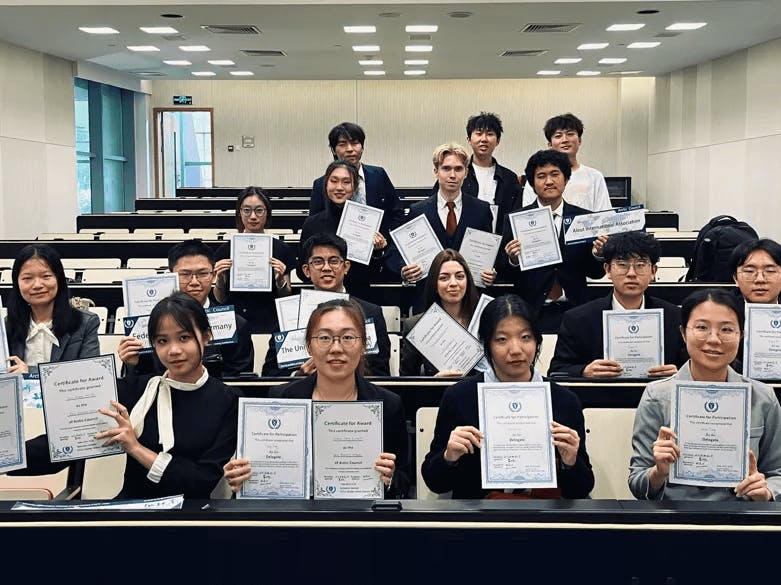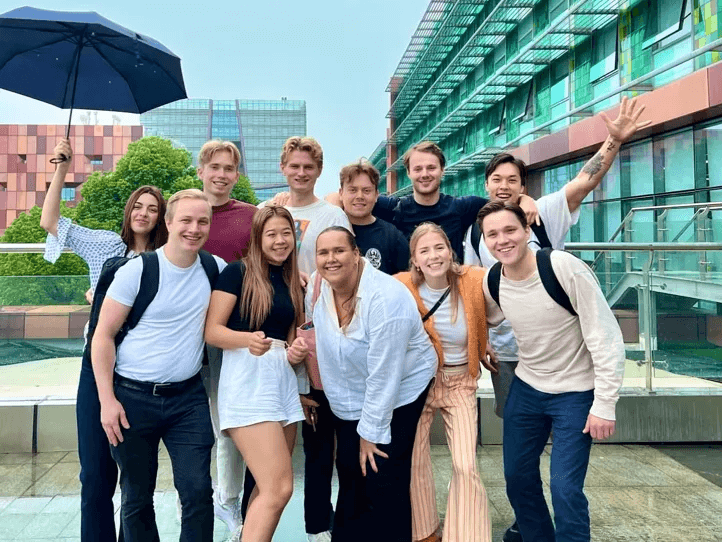Study international business in China
“I think probably the coolest thing about these classes are that we are mixed with the Chinese students,” he says. “The teachers encouraged us to talk to each other, and I learned about so many aspects of Chinese society.”
He credits class discussions with insights he gained that are important to conducting international business in China. For example, China’s household registration (‘hukou’) was something he hadn’t been aware of before.
“I didn’t know that, apart from ID cards, Chinese people also have a hukou,” he says, “and this can affect their access to education, healthcare and other social benefits based on their registration as either urban or rural, local or non-local residents.
“These aspects are very relevant for international management. If I’m going to set up a company or manage an operation in China, I need to know what Chinese employees care about and what impacts their lives, both at work and outside of it.”

Recently, IBSS arranged a company visit for international students to Yadea, a leading Chinese company that manufactures electric scooters in Wuxi, Jiangsu province. During the visit, the students saw the latest battery technology, production lines, and the final assembly stage.
“The factory was incredibly impressive. Everything was very well-organised and highly efficient. Gumø says. “We also learned more about the company’s globalisation strategies, such as their expansion in Indonesia and Vietnam.”

As part of his curriculum at XJTLU, Gumø also attended the module Practical Chinese for Everyday Life.
“It’s a Chinese language course focused around getting by in China. It includes things like buying train tickets, shopping for groceries, haggling, having simple conversations, ordering coffee, and so on. We also learn to read Chinese characters, which really helps with understanding signs and using Chinese apps.
“The teacher is also very good at combining the elements of Chinese culture with the Chinese language, and explaining how everything fits together. It’s very helpful, and also a lot of fun,” he says.
Participation in Model UN


Exploration and self-discovery




Since arriving in China, Gumø says he has become “more open-minded” and “more willing” to listen to ideas that are different from the norm back home.
“I’ve learned a lot about myself. Maybe that’s one of the most important things,” he says. “When you are in your home country, you don’t really think about how you act or how other people act because that’s the way it’s always been.
“But when you go to a completely different place, like China, you realise why you are doing the things you do, and sometimes you start to question, ‘Why don’t we do it some other way? People there are doing the things they do for a reason as well.’
“I think you’d need to live in another country to really understand that the world is a big place and people are very different.”
He says he would recommend other international students to study in China.
Gumø says: “Media and news outlets outside of China tend to portray China in a certain way. So, the impression I had of the country before coming here was very different from the reality I met.
“I think you’d need to come here and talk to Chinese people in order to understand that.”
This article was originally published by XJTLU Global.
Xi’an Jiaotong-Liverpool University
 Xi’an Jiaotong – Liverpool University (XJTLU) is an emerging international educational institution established through a collaborative effort between China’s Xi’an Jiaotong University and the University of Liverpool in the UK. As a unique Sino-Foreign cooperative university, it embodies the best qualities of its esteemed parent institutions and holds the distinction of being the sole university of its kind sanctioned by China’s Ministry of Education.
Xi’an Jiaotong – Liverpool University (XJTLU) is an emerging international educational institution established through a collaborative effort between China’s Xi’an Jiaotong University and the University of Liverpool in the UK. As a unique Sino-Foreign cooperative university, it embodies the best qualities of its esteemed parent institutions and holds the distinction of being the sole university of its kind sanctioned by China’s Ministry of Education.
XJTLU provides undergraduate degree programs in the domains of science, engineering, and management, conferring degrees both from its own Chinese accreditation and the University of Liverpool.
Learn more and apply for XJTLU’s programs through the China Admissions platform.
- Worldwide Students unleash entrepreneurial dreams at XJTLU - February 21, 2025
- 3rd XJTLU International Day bridges diverse cultures - December 17, 2024
- Kasetsart University, Thailand, and XJTLU strengthen ties - December 16, 2024

